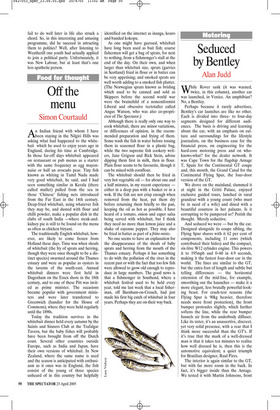Off the menu
Simon Courtauld
An Indian friend with whom I have been staying in the Nilgiri Hills was asking what had happened to the whitebait which he used to enjoy years ago in England, during his time at Cambridge. In those far-off days whitebait appeared on restaurant or pub menus as a starter with the same frequency as egg mayonnaise or half an avocado pear. Tiny fish known as whiting in Tamil Nadu made very good whitebait, he said, and I had seen something similar in Kerala (there called mullet) pulled from the sea in those ‘Chinese’ fishing nets introduced from the Far East in the 14th century. Deep-fried whitebait, using whatever fish they may be, and dusted with flour and chilli powder, make a popular dish in the clubs of south India —where steak-andkidney pie is still to be found on the menu as often as chicken biryani.
The traditionally English whitebait, however, are likely to come frozen from Holland these days. Time was when shoals of whitebait (the fry of sprats and herring, though they were once thought to be a distinct species) swarmed around the Thames estuary and were as popular as oysters in the taverns of the south-east. Annual whitebait dinners were first held in Dagenham on the Essex shore in the 18th century, and to one of these Pitt was invited as prime minister. The occasions became popular with government ministers and were later transferred to Greenwich (handier for the House of Commons), where they were held regularly until the 1890s.
Today the tradition survives in the whitebait dinner held every autumn by the Saints and Sinners Club at the Trafalgar Tavern, but the baby fishes will probably have been brought from off the Dutch coast. Several other countries outside Europe, such as India and Japan, have their own versions of whitebait. In New Zealand, where the same name is used and the season is anticipated with enthusiasm as it once was in England, the fish consist of the young of three species unheard of in this country but helpfully identified on the internet as inanga, koaro and banded kokopu.
As one might have guessed, whitebait have long been used as bait fish; coarse fishermen will get a bag of sprats, for next to nothing, from a fishmonger’s stall at the end of the day. On their own, and when larger than whitebait size, sprats (garvies in Scotland) fried in flour or in batter can be very appetising; and smoked sprats are well worth adding to a smoked fish platter. (The Norwegian sprats known as brisling which used to be canned and sold as Skippers before the second world war were the brainchild of a nonconformist Liberal and obsessive teetotaller called Angus Watson, who was also co-proprietor of The Spectator.) Although there is really only one way to cook whitebait, there are minor variations, or differences of opinion, in the recommended preparation and frying of them. Some wash the fish in water before tossing them in seasoned flour in a plastic bag, while the two supreme fish cookery writers, Jane Grigson and Rick Stein, advise dipping them first in milk, then in flour. Plain flour seems to be favourite, though it can be mixed with cornflour.
The whitebait should then be fried in very hot vegetable oil — for about one and a half minutes, in my recent experience either in a deep pan with a basket or in a wok. If the fish are not crisp enough when removed from the heat, pat them dry before returning them briefly to the pan, keeping the oil as hot as possible. I have heard of a tomato, onion and caper salsa being served with whitebait, but I think they need no more than lemon juice and a shake of cayenne pepper. They may also be fried in batter as part of a fritto misto.
No one seems to have an explanation for the disappearance of the shoals of baby sprats and herring from the mouth of the Thames estuary. Perhaps it has something to do with the pollution of the river in the recent past or with the fact that too few fish were allowed to grow old enough to reproduce in large numbers. The good news is that a fishmonger in Southend, where a whitebait festival used to be held every year, told me last week that a local fisherman, off Burnham-on-Crouch, had just made his first big catch of whitebait in four years. Perhaps they are on their way back.



















































 Previous page
Previous page